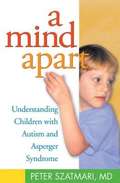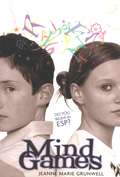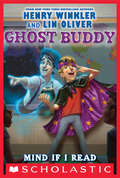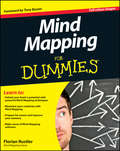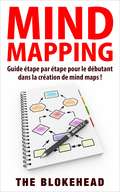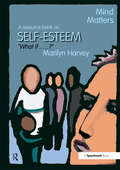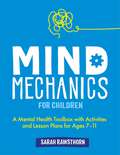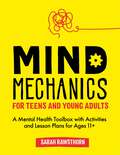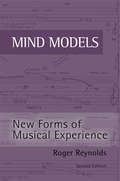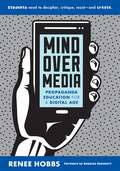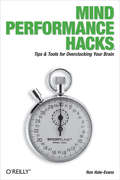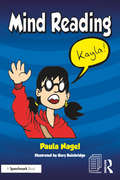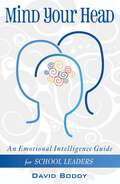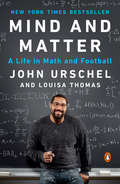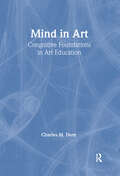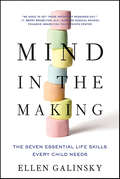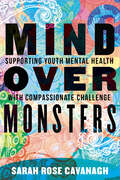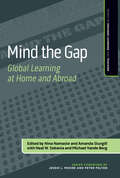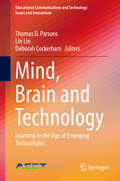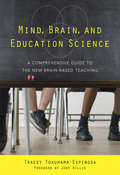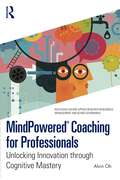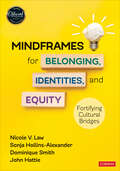- Table View
- List View
Min and Fin (Word Family Readers)
by Liza CharlesworthMin and Fin are twins! Meet them both in this terrific tale that teaches lots and lots of -in words.
Mind Apart
by Peter SzatmariWhy would a child refuse to talk about anything but wasp wings-or the color of subway train doors? What does it mean when a nine-year-old asks questions about death hundreds of times a day? And how can parents build a close relationship with a little girl who hates to be touched? In this compassionate book, leading autism authority Dr. Peter Szatmari shows that children with autism spectrum disorders act the way they do because they think in vastly different ways than other people. Dr. Szatmari shares the compelling stories of children he has treated who hear everyday conversation like a foreign language or experience hugs like the clamp of a vise. Understanding this unusual inner world-and appreciating the unique strengths that thinking differently can bestow-will help parents relate to their children more meaningfully, and make the "outer world" a less scary place.
Mind Games
by Jeanne Marie GrunwellSix Clearview Middle School seventh-graders are $500 richer after buying a Maryland State Lottery ticket this week in order to test a scientific hypothesis.Benjamin Lloyd, 12, whose father purchased the winning ticket, declined to discuss details of the students' experiment, citing concerns of competition in the March 13 state science fair. . . . Mr. Ennis was as tight-lipped as his students regarding the nature of their experiment. "They plan to go public at the science fair. And that's about all I can say. But," he said, grinning, "I do predict a win."Thus reads an article in the Waverly Times, which is Exhibit Ain the Mad Science Club's report to prove the existence of ESP. As told through the individual voices of a diverse cast of characters, Mind Games crackles with personality. Discoveries from the paranormal to the personal abound in this insightful exploration of friendship, science, ESP-and the lottery.
Mind If I Read Your Mind?: Mind If I Read Your Mind? (Ghost Buddy #2)
by Henry Winkler Lin OliverNew York Times–Bestselling Authors: “A sixth-grader and his live-in ghost further cement their friendship . . . The cast is thoroughly likable.” —Kirkus ReviewsIt’s time for Moorepark Middle School’s annual Speak Out Challenge, and Billy Broccoli thinks he’s got it made. With his best friend Hoover Porterhouse—the ghost with the most—by his side, Billy’s got the competition in the bag. Who wouldn’t vote for a demonstration on mind reading?But when Billy lands a spot on the sixth-grade team, he starts spending more time with his new teammates than he does with Hoover. And the Hoove plays second fiddle to no one! If Billy’s not careful, his secret weapon might just vanish into thin air, leaving Billy to pick up the pieces of a demonstration day disaster!Praise for Ghost Buddy: Zero to Hero“An endearingly uncool hero . . . Readers will root for Billy.” —Publishers Weekly
Mind Mapping For Dummies
by Florian RustlerUnlock your brain's potential using mind mapping Mind mapping is a popular technique that can be applied in a variety of situations and settings. Students can make sense of complex topics and structure their revision with mind mapping; business people can manage projects and collaborate with colleagues using mind maps, and any creative process can be supported by using a mind map to explore ideas and build upon them. Mind maps allow for greater creativity when recording ideas and information whatever the topic, and enable the note-taker to associate words with visual representations. Mind Mapping For Dummies explains how mind mapping works, why it's so successful, and the many ways it can be used. It takes you through the wide range of approaches to mind mapping, looks at the available mind mapping software options, and investigates advanced mind mapping techniques for a range of purposes, including studying for exams, improving memory, project management, and maximizing creativity. Suitable for students of all ages and study levels An excellent resource for people working on creative projects who wish to use mind mapping to develop their ideas Shows businesspeople how to maximize their efficiency, manage projects, and brainstorm effectively If you're a student, artist, writer, or businessperson, Mind Mapping For Dummies shows you how to unlock your brain's potential.
Mind Mapping: Guide étape par étape pour le débutant dans la création de mind maps !
by The BlokeheadGuide étape par étape pour le débutant dans la création de mind maps !
Mind Matters - Self Esteem
by Marilyn HarveyFocusing on self-esteem this title is designed to raise awareness among young people of caring for their own mental health and encouraging them to support others experiencing mental health problems. It is a resource bank containing: exploration of the nature of self-esteem; 10 activities you can use or adapt to a range of situations to increase young people's understanding of self-esteem; and case study illustrating a successful project. It supports young people's learning of factors affecting their self-esteem. It includes tips on how to boost levels of self-confidence.
Mind Mechanics for Children: A Mental Health Toolbox with Activities and Lesson Plans for Ages 7-11 (Mind Mechanics for Mental Health)
by Sarah RawsthornMind Mechanics is a comprehensive resource to support schools in teaching pupils about mental health. Drawing on a wide range of therapeutic interventions, including CBT, Behavioural Activation and Compassion-Focussed Therapy, it provides activities and lesson plans to empower children with the skills they need to manage their mental health throughout life.The book contains lesson plans, games and activities, assessment tools and information on risk factors and specific issues that might impact children. It also features photocopiable and downloadable worksheets, making the provision of mental health teaching simple. Mind Mechanics can be used flexibly as a full programme as part of the school's Personal, Social, Health and Citizenship curriculum, as a targeted intervention for a group or individual, or as a resource bank of individual activities to use as and when needed.
Mind Mechanics for Teens and Young Adults: A Mental Health Toolbox with Activities and Lesson Plans for Ages 11+ (Mind Mechanics for Mental Health)
by Sarah RawsthornMind Mechanics is a comprehensive resource to support schools in teaching pupils about mental health. Drawing on a wide range of therapeutic interventions, including CBT, Behavioural Activation and Compassion-Focussed Therapy, it provides activities and lesson plans to empower teens with the skills they need to manage their mental health throughout life.The book contains lesson plans, games and activities, assessment tools and information on risk factors and specific issues that might impact teens. It also features photocopiable and downloadable worksheets, making the provision of mental health teaching simple. Mind Mechanics can be used flexibly as a full programme as part of the school's Personal, Social, Health and Citizenship curriculum, as a targeted intervention for a group or individual, or as a resource bank of individual activities to use as and when needed.
Mind Models
by Roger ReynoldsThis new edition of Mind Models reintroduces and renews a classic work on 20th century composition, one that has remained relevant for over a quarter century -- and should remain a central reading for decades to come.
Mind Over Media: Propaganda Education For A Digital Age
by Renee HobbsPropaganda is inescapable. It’s everywhere. Students need to analyze, resist, critique—and create. Media literacy educators have always insisted that we are both creators and receivers of media messages. The truth of this is even more apparent in today’s digital environment, with children and adults alike participating in a ubiquitous, nonstop stream of social media. Clearly, students need the tools to interpret news and information critically—not just for school but for life in a “post-truth” world, where the lines blur between entertainment, information, and persuasion. Renee Hobbs demonstrates how a global perspective on contemporary propaganda enables educators to stimulate both the intellectual curiosity and the cultural sensitivities of students. Replete with classroom and online learning activities and samples of student work, Mind Over Media provides a state-of-the-art look at the theory and practice of propaganda in contemporary society, and shows how to build learners’ critical thinking and communication skills on topics including computational propaganda, content marketing, fake news, and disinformation.
Mind Performance Hacks: Tips & Tools for Overclocking Your Brain
by Ron Hale-EvansYou're smart. This book can make you smarter.Mind Performance Hacks provides real-life tips and tools for overclocking your brain and becoming a better thinker. In the increasingly frenetic pace of today's information economy, managing your life requires hacking your brain. With this book, you'll cut through the clutter and tune up your brain intentionally, safely, and productively.Grounded in current research and theory, but offering practical solutions you can apply immediately, Mind Performance Hacks is filled with life hacks that teach you to:Use mnemonic tricks to remember numbers, names, dates, and other flotsam you need to recallPut down your calculator and perform complex math in your head, with your fingers, or on the back of a napkinSpark your creativity with innovative brainstorming methodsUse effective systems to capture new ideas before they get awayCommunicate in creative new ways-even using artificial languagesMake better decisions by foreseeing problems and finding surprising solutionsImprove your mental fitness with cool tricks and gamesWhile the hugely successful Mind Hacks showed you how your brain works, Mind Performance Hacks shows you how to make it work better.
Mind Reading: But What If...; Mind Reading; Stuck On A Loop; Waht Is It? (Rollercoaster Series)
by Paula NagelThis is a focus on feelings of social isolation and unhelpful thinking habits linked to friendship difficulties. Stacie wonders why her best friend, Kayla, ignores her when she sees her in town at the weekend. All weekend she thinks about the possible reasons, and imagines some of the negative things Kayla might be saying or thinking about her. By Monday morning, she has convinced herself they are true, and that Kayla no longer wants to be her friend. She avoids Kayla at school, which causes further problems. At break time Stacie sees Kayla with another group of girls and imagines they are talking about her. At the end of the day Kayla catches up with Stacie and asks her if she has done something wrong. Stacie says she knows Kayla no longer wants to be her friend because she ignored her in town. Kayla explains she had just been fitted with her new contact lenses and didn't even see her! Stacie is shocked and confesses how she imagined she knew what Kayla was thinking and saying about her. Kayla laughs and they joke about Stacie being a very poor 'mind reader'. Stacie agrees that if she catches herself mind reading again then she will test out her thoughts by talking about them. The accompanying, 'Let's talk about.mind reading,' highlights this common thinking error, and suggests further coping strategies. Paul Nagel has worked as an educational psychologist for 17 years. This has included working as a Lead Professional Educational Psychologist managing a traded service, as well as holding Senior Specialist posts for early years and disability. Over the years Paula has worked in multi agency teams within paediatric services, youth offending teams, Sure Start and an anti bullying service. She is currently Principal Educational Psychologist (North) for the national children's mental health charity, Place2Be. Before qualifying as an Educational Psychologist Paula was a primary school teacher. Gary Bainbridge is an artist, comics creator and secondary school Art, Photography and Media Studies teacher from Durham. He's best known for the North East based kitchen sink superhero comic Sugar Glider and the Newcastle-set crime fiction comic, Nightbus. Gary teaches at an academy in Northumberland.
Mind Your Head: An Emotional Intelligence Guide For School Leaders
by David BoddyAt a time when recent governments continue to suffocate head teachers in a sea of bureaucratic initiatives, this book encourages educational leaders to be adventurous, distinctive and above all independent. David Boddy calls on his 30-year passion for philosophy and meditation to inspire heads and aspiring heads to manage the enormous mental and emotional challenges of the job, while still reaching for the best in all around them. Mind Your Head encourages readers to challenge their experiences both as head teachers and more importantly as lead teachers, to educate and to inspire those whose lives they touch on a daily basis: colleagues, parents and, first and foremost, pupils.
Mind Your Head: An Emotional Intelligence Guide For School Leaders
by David BoddyAt a time when recent governments continue to suffocate head teachers in a sea of bureaucratic initiatives, this book encourages educational leaders to be adventurous, distinctive and above all independent. David Boddy calls on his 30-year passion for philosophy and meditation to inspire heads and aspiring heads to manage the enormous mental and emotional challenges of the job, while still reaching for the best in all around them. Mind Your Head encourages readers to challenge their experiences both as head teachers and more importantly as lead teachers, to educate and to inspire those whose lives they touch on a daily basis: colleagues, parents and, first and foremost, pupils.
Mind and Matter: A Life in Math and Football
by Louisa Thomas John UrschelFor John Urschel, what began as an insatiable appetite for puzzles as a child developed into mastery of the elegant systems and rules of mathematics. By the time he was thirteen, Urschel was auditing a college-level calculus course. But when he joined his high school football team, a new interest began to eclipse the thrill he felt in the classroom. Football challenged Urschel in an entirely different way, and he became addicted to the physical contact of the sport. After he accepted a scholarship to play at Penn State, his love of math was rekindled. As a Nittany Lion, he refused to sacrifice one passion for the other. Against the odds, Urschel found a way to manage his double life as a scholar and an athlete. While he was an offensive lineman for the Baltimore Ravens, he simultaneously pursued his PhD in mathematics at MIT. Weaving together two separate narratives, Urschel relives for us the most pivotal moments of his bifurcated life. He explains why, after Penn State was sanctioned for the acts of former coach Jerry Sandusky, he declined offers from prestigious universities and refused to abandon his team. He describes his parents’ different influences and their profound effect on him, and he opens up about the correlation between football and CTE and the risks he took for the game he loves. Equally at home discussing Georg Cantor’s work on infinities and Bill Belichick’s playbook, Urschel reveals how each challenge—whether on the field or in the classroom—has brought him closer to understanding the two different halves of his own life, and how reason and emotion, the mind and the body, are always working together. “So often, people want to divide the world into two,” he observes. “Matter and energy. Wave and particle. Athlete and mathematician. Why can’t something (or someone) be both?”
Mind in Art: Cognitive Foundations in Art Education
by Charles M. DornThis book is for the reader who believes that thinking about and making art is intelligent behavior and that art as a subject in the K-12 school curriculum should not be used as an alibi for other curricular objectives. It examines and makes explicit those cognitive behaviors normally associated with most higher order thinking and problem solving activity and explains how they function in the act of creative forming. Its goal is ultimately to find ways to use these behaviors in the construction of an intelligent art curriculum for K-12 American schools. This is perhaps the only text in the field designed to assist teachers in meeting the challenges of teaching in the Goals 2000 curriculum and evaluation reform effort, acquainting them with both the National Art Standards and with the assessment processes needed in order for them to become accountable. Mind in Art grapples with current and relevant theory, research, and unsolved problems. It is cohesive as it attempts to bring together information that is only partially known, even among those who are college professors. And it takes a critical look at the ideas and points of view that have created divisiveness and shabby thinking in the field. In this book Charles Dorn significantly advances thinking in the field of art education.
Mind in the Making: The Seven Essential Life Skills Every Child Needs
by Ellen Galinsky“Ellen Galinsky—already the go-to person on interaction between families and the workplace—draws on fresh research to explain what we ought to be teaching our children. This is must-reading for everyone who cares about America’s fate in the 21st century.” — Judy Woodruff, Senior Correspondent for The PBS NewsHour Families and Work Institute President Ellen Galinsky (Ask the Children, The Six Stages of Parenthood) presents a book of groundbreaking advice based on the latest research on child development.
Mind over Monsters: Supporting Youth Mental Health with Compassionate Challenge
by Sarah Rose CavanaghAn investigation into the mental health crisis affecting young adults today, and an impassioned argument for creating learning environments characterized both by compassion and challenge.Alarming statistics in recent years indicate that mental health problems like depression and anxiety have been skyrocketing among youth. To identify solutions, psychologist and professor Sarah Rose Cavanagh interviews a roster of experts across the country who are dedicating their lives to working with young people to help them actualize their goals, and highlights voices of college students from a range of diverse backgrounds.Cavanagh also brings the reader on an invigorating tour of pedagogical, neuroscientific, and psychological research on mental health—one that involves her own personal journey from panic to equilibrium.The result of these combined sources of inquiry indicates that to support youth mental health, we must create what Cavanagh calls compassionate challenge— first, we need to cultivate learning and living environments characterized by compassion, and then, we need to guide our youth into practices that encourage challenge, helping them face their fears in an encouraging, safe, and even playful way.Mind over Monsters is a must-read for teachers, administrators, parents, and young people themselves.
Mind the Gap: Global Learning at Home and Abroad (Series on Engaged Learning and Teaching)
by Nina Namaste and Amanda Sturgill with Neal W. Sobania and Michael Vande BergCo-published with There is growing awareness that global learning is not confined to university, credit-bearing off campus international programs, and that institutions of higher learning have, up until now, conceived of global education too narrowly. Global learning through study abroad and off-campus domestic study fits into a larger context of students’ educational experiences. You can find global learning as part of other high-impact practices; domestic off-campus programs, undergraduate research, and service- or community-based learning all can be global learning opportunities. On-campus global learning can occur in the disciplines and in the core curriculum as well. Language and culture, anthropology, sociology, and other departments, multicultural centers, and diversity and inclusivity offices, to name a few, also teach students to be global learners. Global learning pertains to the many staff and faculty educators who intentionally encourage students to engage with and successfully navigate difference. Thus, there is a growing need for bridging across disciplinary and administrative silos, silos that are culturally bound within academia. The gaps between these silos matter as students seek to integrate off- and on-campus learning. Higher education needs a new, holistic assessment of global learning. This book investigates not just student learning, but also faculty experiences, program structures, and pathways that impact global learning, and expands the context of global learning to show its antecedents and impacts as a part of the larger higher education experience. Chapters look at recent developments such as short-term, off-campus, international study and certificate/medallion programs, as well as blended learning environments and undergraduate research, all in the context of multi-institutional comparisons. Global learning is also situated in a larger university context. Visit the Mind the Gap Companion Page, hosted by the Center of Engaged Learning.
Mind, Brain and Technology: Learning in the Age of Emerging Technologies (Educational Communications and Technology: Issues and Innovations)
by Thomas D. Parsons Lin Lin Deborah CockerhamAs technology becomes increasingly integrated into our society, cultural expectations and needs are changing. Social understanding, family roles, organizational skills, and daily activities are all adapting to the demands of ever-present technology, causing changes in human brain, emotions, and behaviors. An understanding of the impact of technology upon our lives is essential if we are to adequately educate children for the future and plan for meaningful learning environments for them. Mind, Brain and Technology provides an overview of these changes from a wide variety of perspectives. Designed as a textbook for students in the fields and interdisciplinary areas of psychology, neuroscience, technology, computer science, and education, the book offers insights for researchers, professionals, educators, and anyone interested in learning more about the integration of mind, brain and technology in their lives. The book skilfully guides readers to explore alternatives, generate new ideas, and develop constructive plans both for their own lives and for future educational needs.
Mind, Brain, and Education Science: A Comprehensive Guide to the New Brain-Based Teaching
by Tracey Tokuhama-EspinosaEstablishing the parameters and goals of the new field of mind, brain, and education science. A groundbreaking work, Mind, Brain, and Education Science explains the new transdisciplinary academic field that has grown out of the intersection of neuroscience, education, and psychology. The trend in "brain-based teaching" has been growing for the past twenty years and has exploded in the past five to become the most authoritative pedagogy for best learning results. Aimed at teachers, teacher trainers and policy makers, and anyone interested in the future of education in America and beyond, Mind, Brain, and Education Science responds to the clamor for help in identifying what information could and should apply in classrooms with confidence, and what information is simply commercial hype. Combining an exhaustive review of the literature, as well as interviews with over twenty thought leaders in the field from six different countries, this book describes the birth and future of this new and groundbreaking discipline. Mind, Brain, and Education Science looks at the foundations, standards, and history of the field, outlining the ways that new information should be judged. Well-established information is elegantly separated from "neuromyths" to help teachers split the wheat from the chaff in classroom planning, instruction and teaching methodology.
MindPowered® Coaching for Professionals: Unlocking Innovation through Cognitive Mastery (Routledge-Solaris Applied Research in Business Management and Board Governance)
by Alvin OhIn an era where digital transformation reshapes every industry, the greatest competitive advantage isn't technology—it's the power of the human mind. MindPowered® Coaching (MPC) revolutionizes how leaders and organizations approach innovation, revealing the profound connection between mindset and breakthrough thinking.Drawing from extensive research and real-world applications, this book unveils 22 core principles that form the foundation of the MindPowered® Coaching framework. Through detailed case studies of successful implementations across global organizations, readers will discover how to cultivate environments where innovation thrives naturally. This book delves deep into the psychology of creative problem-solving, exploring how mindset shifts can trigger organizational transformation. It presents practical strategies for developing cognitive resilience, enhancing collaborative thinking, and building sustainable innovation practices. Each chapter combines theoretical insights with actionable techniques, providing a comprehensive roadmap for implementing MPC within any organizational context.Perfect for CEOs, business leaders, and professionals navigating the digital age, this book provides the tools to transform how your organization approaches innovation. Whether you're leading a digital transformation or seeking to amplify your team's creative potential, MindPowered® Coaching offers the blueprint for turning cognitive capabilities into competitive advantages.
Mindframes for Belonging, Identities, and Equity: Fortifying Cultural Bridges
by John Hattie Dominique Smith Sonja Hollins-Alexander Nicole V. LawThe essentials for creating a supportive and inclusive space for all Learning is hard work and the latest education research shows that a sense of psychological safety is a must if we want students to successfully progress along their education journey. In Mindframes for Belonging, Identities, and Equity, you′ll discover 10 unique mindframes backed by extensive education research and real-life scenarios. Through self-reflection and powerful vignettes, you′ll learn how to apply these core principles in your daily life to foster a more inclusive and understanding learning environment. Inside, the authors explore the five critical themes behind these mindframes, including Impact and Efficiency Feedback and Assessment Challenging Growth Learning Culture and Relationships Ownership and Accountability Harnessing the power of these mindframes is not just about improving education--it′s about fostering an environment where every student feels valued, safe, and able to learn without fear.
Mindframes for Belonging, Identities, and Equity: Fortifying Cultural Bridges
by John Hattie Dominique Smith Sonja Hollins-Alexander Nicole V. LawThe essentials for creating a supportive and inclusive space for all Learning is hard work and the latest education research shows that a sense of psychological safety is a must if we want students to successfully progress along their education journey. In Mindframes for Belonging, Identities, and Equity, you′ll discover 10 unique mindframes backed by extensive education research and real-life scenarios. Through self-reflection and powerful vignettes, you′ll learn how to apply these core principles in your daily life to foster a more inclusive and understanding learning environment. Inside, the authors explore the five critical themes behind these mindframes, including Impact and Efficiency Feedback and Assessment Challenging Growth Learning Culture and Relationships Ownership and Accountability Harnessing the power of these mindframes is not just about improving education--it′s about fostering an environment where every student feels valued, safe, and able to learn without fear.

